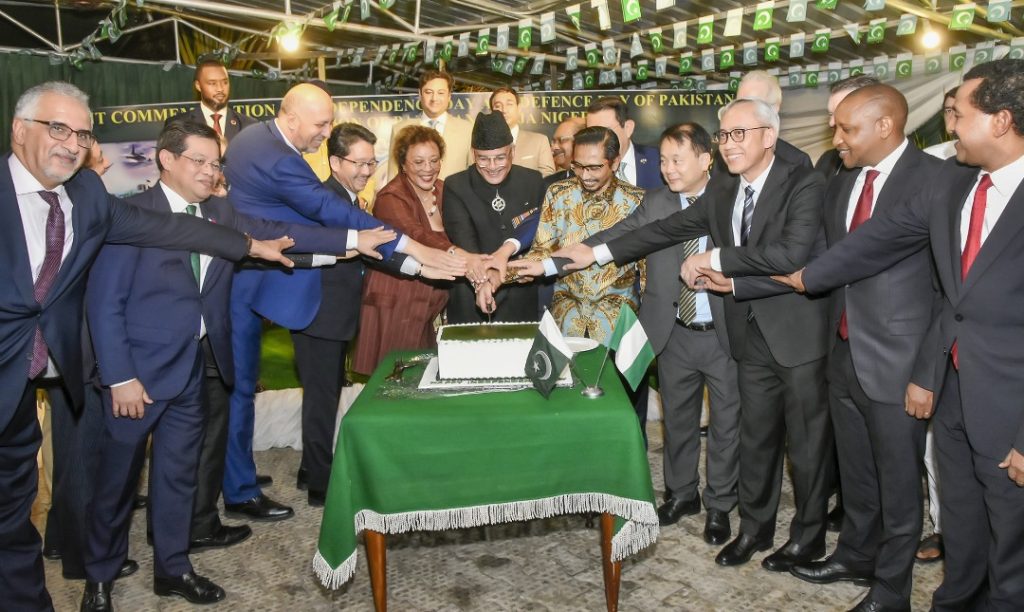Foreign news
Pakistan High Commission in Nigeria Observes Independence and Defence Day, Tributes Paid to Heroes and Martyrs

By Ibrahim Lawal
The High Commission of Pakistan in Nigeria has commemorated the country’s Independence and Defence Day with a grand ceremony that paid glowing tributes to Pakistan’s heroes and martyrs.

The event, which highlighted the sacrifices and bravery of Pakistan’s armed forces, drew a distinguished audience that included ambassadors, defence attachés from various countries, senior Nigerian civil and military officials, and members of the Pakistani community in Nigeria.
Speaking at the joint commemoration, the High Commissioner of Pakistan to Nigeria, Major General (Rtd) Sohail Ahmad Khan, described the occasion as a profound honour and celebrated Pakistan’s resilience, achievements, and global contributions since its independence in 1947.
He stated:
“Pakistan’s journey since 1947 has been one of remarkable achievement. Today, our nation stands tall on the world stage, contributing to global peace, economic growth, and human development. We are a key player in international forums, a reliable partner in counter-terrorism efforts, and a voice for justice in regions like Kashmir and Palestine. Our contributions to UN peacekeeping missions, with over 200,000 troops deployed since 1960, underscore our commitment to global stability.
“Pakistan is the fifth-largest producer of cotton, the fourth-largest producer of rice, and the fifth-largest producer of sugarcane. We also rank among the world’s top ten in the production of wheat, mangoes, dates, and oranges, while serving as a leading supplier of sports goods. Home to the world’s second tallest peak, K2, and five of the planet’s 14 highest mountains, Pakistan’s natural wonders are as remarkable as its economic and industrial strength.”
On the country’s military prowess, Major General Khan praised the courage and sacrifice of Pakistan’s armed forces, noting that the nation ranks 12th globally in the 2025 Global Firepower Index and remains a responsible nuclear state.
“No tribute to Pakistan’s stature is complete without honouring our armed forces,” he said. “They exemplify extraordinary courage, unwavering resolve, and profound sacrifice in the unyielding battle against terrorism. Over 80,000 brave men and women have laid down their lives, safeguarding not only our homeland but also contributing to global peace. The recent success of Operation Bunyanum Marsoos against Indian aggression in May 2025 stands as a testament to this strength.”
The High Commissioner further emphasized the strong and enduring ties between Pakistan and Nigeria, describing the relationship as one rooted in brotherhood, trust, and strategic partnership.
“Pakistan-Nigeria relations exemplify decades of friendship, marked by rapidly growing trade and economic ties, as well as deepening defence and security cooperation across all services,” he noted.
He concluded by calling for a renewed commitment to building a stronger, innovative, peaceful, and prosperous Pakistan.
“As we commemorate our Independence and Defence Day, let us renew our dedication to a future of innovation, peace, and prosperity. The Pakistani nation stands tall and firm against all odds. Together, we are unbreakable.”
Foreign news
Pakistan Moves to Deepen Diplomatic, Economic Relations With Nigeria

The Government of the Islamic Republic of Pakistan has called for deeper diplomatic and economic ties with the Nigerian government to foster development for both countries.
Mr Rana Ihsaan, the Coordinator to the Prime Minister of Pakistan made the call in an interview with the News Agency of Nigeria (NAN) during his working vist to Nigeria on Wednesday in Abuja.
NAN reports that the visiting Coordinator held a closed-door meeting with Yusuf Tuggar, the Minister of Foreign Affairs.
After the meeting, he said that both both sides had agreed on deepening relations in the areas of trade and commerce, among others.
Ihsaan said that both countries must see the need to accelerate efforts towards a Bilateral Trade Agreement (BTA).
He said that Pakistan had already submitted a draft BTA and was awaiting Nigeria’s response.
According to him, discussions centered on easing visa processes, expanding educational exchanges, and strengthening Cooperation in sectors such as Minerals, Youth training, and Defence were highlighted.
Ihsaan said that Pakistan had already implemented visa-on-arrival for Nigerians at no cost, and urged Nigeria to reciprocate to enhance people-to-people ties.
He stressed the importance of high-level engagements between both nations, describing Nigeria and Pakistan as very similar countries with large populations, youthful demographics, and vast economic potentials.
“Deeper collaboration will unlock opportunities in trade, education and investment, while further solidifying long-standing diplomatic relations,” he said.
He said that aside from visiting the foriegn Minister and other top government officials in Nigeria, he was also in the country to attend the on-going West Africa Beauty Exhibition holding in Lagos.
He described the exhibition as one of the continent’s largest cosmetic fairs, adding that he led a delegation of 19 Pakistani business people exploring Nigeria’s estimated 10 million dollar beauty and cosmetics market.
Ihsaan said that Nigeria was a gateway to Africa, adding that Pakistani products, like cosmetics, Textiles, Pharmaceuticals, Food items and Sports goods were already gaining traction in the country.
He encouraged Pakistani exhibitors to establish offices, Warehouses and logistics partnerships to strengthen their foothold in the Nigerian market.
Ihsaan further addressed concerns from Nigerian businesses on the ease of doing business in Pakistan.
He said that the Trade Development Authority of Pakistan had been supporting Nigerian participants at major exhibitions to achieve the ease of doing business.
“The Special Investment Facilitation Council (SIFC) serves as a one-stop platform for Nigerians interested in investing in Pakistan,” he said
Culled from NAN
-

 Featured6 years ago
Featured6 years agoLampard Names New Chelsea Manager
-

 Featured6 years ago
Featured6 years agoFG To Extends Lockdown In FCT, Lagos Ogun states For 7days
-

 Featured6 years ago
Featured6 years agoChildren Custody: Court Adjourns Mike Ezuruonye, Wife’s Case To April 7
-

 Featured6 years ago
Featured6 years agoNYSC Dismisses Report Of DG’s Plan To Islamize Benue Orientation Camp
-

 Featured4 years ago
Featured4 years agoTransfer Saga: How Mikel Obi Refused to compensate me After I Linked Him Worth $4m Deal In Kuwait SC – Okafor
-
Sports3 years ago
TINUBU LAMBAST DELE MOMODU
-

 News11 months ago
News11 months agoZulu to Super Eagles B team, President Tinubu is happy with you
-
Featured6 years ago
Board urges FG to establish one-stop rehabilitation centres in 6 geopolitical zones
